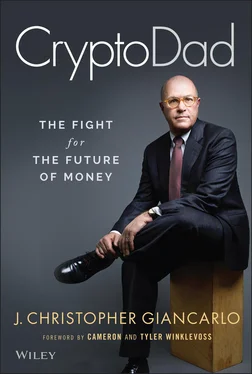After graduation, I spent three years in Nashville, Tennessee, mostly living with two buddies in a ramshackle apartment building adjacent to Centennial Park. I studied law at Vanderbilt University during the week and listened to country music in bars on weekends. In September 1984, I began work on Wall Street as a first-year associate lawyer at the prominent law firm of Mudge Rose Alexander and Ferdon, where Richard Nixon had once been a partner. I had accepted the offer to train as a corporate lawyer, but, after nine months, I was still spending six days a week drafting municipal bond indentures. I left for an even more venerable New York City practice, Curtis Mallet-Prevost, Colt & Mosle.
Joining Curtis Mallet proved an important move. And not just for my career. The same week I started, so did a comic and kindhearted woman who caught my eye. Regina Beyel, from Long Island's Suffolk County, worked evenings as a floor secretary at the firm to earn tuition at New York's Hunter College, where she was studying to be a teacher. As a young associate I worked a lot of late nights—even when it wasn't necessary, as I gradually fell in love with Regina. In the fall of 1988, while we were dating, the firm asked me to do an extended stint in London. They pressed me for a quick answer and a start date. So I took courage and proposed, but with the caveat that a “yes” meant moving abroad. Regina said yes to both marriage and what turned out to be a three-year European honeymoon.
Returning to London was wonderful. We rented a one-bedroom flat just off Kensington High Street, made friends, threw dinner parties, traveled throughout the British Isles and on the Continent and, during England's damp winters, lay by the fireplace to stay warm. In its glow, our marriage was forged.
In London in the early 1990s, I started a new program for the firm. Called “An Entrepreneur's Guide to Doing Business in the U.S.,” it was targeted at British tech startups. My law practice grew.
In a few years, Regina and I moved back to the United States. With her encouragement, I stepped down from Curtis Mallet and launched a boutique law practice representing European emerging technology companies. With my good friend Paul Gleiberman—a brilliant lawyer—Giancarlo & Gleiberman grew rapidly to 14 lawyers, with offices in New York and Washington.
Regina and I then started our family. Within a space of four years, Emma, Luke, and Henry were born. At the firm, Regina did the billing and bookkeeping. She'd bring our babies with her and let them sleep in drawers pulled out of file cabinets. Our client numbers increased. We moved on up the road, acquiring a ramshackle, shingle style 1897 Victorian house in a quiet neighborhood in northern Bergen county. The house had no insulation, air conditioning, finished basement or garage, but it had charm. We set about repairing and restoring it room by room. Whatever it lacked, it had an abundance of children's laughter, hearty Sunday suppers, and a warm welcome to every visitor.
The 1997–2000 Internet bubble was then inflating. To handle the enormous workload, I merged my New York practice into Brown Raysman, a trailblazing, tech-focused law firm started by the innovative Peter Brown and Richard Raysman. With their support, I cofounded the first ever legal journal of online financial trading. 1
Not long afterward, I represented a group of investors led by Michael Adam, a brilliant pioneer of automated market trading. 2 I advised them in acquiring Fenics, then and now, a widely used tool to price and trade currency options. In early 2000, Fenics retained a large investment bank to conduct its initial public offering in London. Again with Regina's encouragement, I took a leave of absence from Brown Raysman to manage the IPO. I found a flat in London and immediately went to work. The stock market was approaching a historic high. It was a frantic period, with weekdays spent in London and weekends in New Jersey.
Suddenly, alas, it was over. On April 14, 2000, US stocks plummeted 9%, capping off five days of stunning losses that handed the Nasdaq composite index a 25% loss, its then worst weekly performance ever. The Dow Jones industrial average also tumbled, trouncing the previous record one-day percentage drop and triggering circuit breakers at the New York Stock Exchange. The dot-com bubble had burst. A few days later, Fenics' IPO was shelved. I returned to the United States to assist the investors in a sale of the company. I had taken a chance and it had failed.
In fact, it turned out for the best. The buyer of Fenics was GFI Group, an “interdealer broker,” which is a type of institutional agent that operates marketplaces for wholesale trading by the largest banks and financial institutions. Interdealer brokers, or IDBs, as they are known, were the precursors to SEFs that Congress recognized in Dodd–Frank. GFI Group specialized in brokering a type of derivative financial instrument called a swap. Swaps, as I mentioned earlier, do not trade on recognized exchanges, but rather on private, managed trading networks of the kind operated by GFI Group.
I immediately hit it off with GFI's brilliant founder, Mickey Gooch. He encouraged me to stay on and implement his vision of highly efficient marketplaces for financial institutions melding skilled professional brokers with market data, software analytics, and automated trade execution. I accepted.
As GFI's head of corporate development, I helped raise several rounds of private equity. With the proceeds, we opened additional offices in financial centers around the world and built some of the first electronic platforms for trading swaps. We also invested in the former Chicago Board of Trade Clearing Corporation and helped convert it into the first clearinghouse for credit default swaps, or CDS. In time, GFI grew into the world's largest trading platform for CDS products and other over-the-counter derivatives.
GFI's offices were then at 100 Wall Street. One summer day not long after joining the firm, I was returning from lunch when I came across a crowd in front of our building. At its center was a young man dancing wildly. I chuckled and went up to the office. Coming out of the elevator, I saw many of the brokers looking out the window and laughing at the young dancer. Someone explained to me that he was a GFI trainee serving a half hour's punishment for having screwed up a lunch order. When the dancer returned later, he was teased mightily. Someone shouted, “What a waste of a Wharton education!”
I was surprised at the hazing. I relayed the story to Gooch, who said that, rather than being a random bit of unpleasantness, what took place was an important part of the young man's training. Successful broking—the shorthand term for what brokers do—required individuals to remember for short periods of time discrete sets of random pricing data segmented by individual customers. Because the financial consequence of getting such pricing wrong could be enormous, prospective brokers had to develop memory skills away from the desk. Thus, trainee brokers listened to and recorded transactions for months before actually handling a trade. They also were required to take lunch orders that were made deliberately complicated. They were crazy things, like:
“I'll have a ham sandwich on whole wheat with two pickles, no lettuce, but olive paste on one slice of bread and honey mustard on the other and three oranges. No, make that two oranges and hold the honey mustard!”
Gooch explained that the trainee would get 12 such orders at once and, if he screwed up just one, the consequence was a half hour dancing on the corner or some other ridiculous embarrassment that they would never forget. Once the trainee could handle a lunch order with tens of dollars at stake, he could begin to undertake more sensitive work with millions of dollars at stake.
Читать дальше












